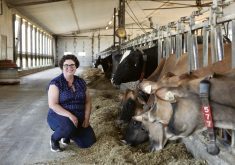There’s a business school maxim that says, “failing to plan is planning to fail.” Based on the experience of Canadian farmers, it’s certainly true of value adding.
Gary Morton, a Nova Scotia ag business consultant who has helped farmers launch value-added products for more than 20 years, likes to begin talking to those farmers by pointing out that while 80 per cent of small business startups fail, 95 per cent of franchise business startups succeed.
The reason, says Morton, is that franchises have a step-by-step blueprint for success. They know what to expect, and how much time and energy it will take.
Read Also

‘No agenda, no attenda’: How to professionalize your family farm meetings
Establishing meeting ground rules can help a farm family find ways to communicate that work for the business and the family.
It’s too easy to dangerously underestimate how much time and cost is involved in launching a new product, Morton warns.
Even so, farmers can boost their odds by planning, says Jessica Kelly, direct farm marketing program lead with the Ontario agriculture ministry. Planning helps you predict obstacles and weed out bad ideas. It also helps prevent those nasty, stress-inducing surprises that cost you time and money.
When you start the planning process, Andreas Boecker, ag business professor at the University of Guelph, recommends you focus on your goals. (Boecker has worked with about 25 farmers studying their value-added businesses, and a link to a summary of his work, along with other valuable online business analysis tools, is in the resources section at the end of this article.)
“You need to understand your motivation,” Boecker says. Is it to put bread on the table for your family, or is it primarily a retirement project or a hobby? Is it to create jobs for your kids? Or is it to help keep valuable employees on year round?
Your goals will determine how much income you need to generate, says Boecker.
Once you’ve got that basic perspective, agrees Kelly, it’s time to tackle specific areas of your business plan, including detailed subplans for marketing, finance, human resources and production/operations.
Your plan doesn’t have to be a glossy showpiece (it may be more useful if it isn’t), but it should define your goals, outline responsibilities, and set benchmarks for assessing progress. Plus, it should project finances.
The business plan should also provide the essential documentation usually required by financial institutions and government funding agencies.
In the planning stages, it’s essential to trace the production process from the beginning right through to delivery to the customer. Estimate how much space is needed to house production equipment, store inputs and store market-ready product. How will your product get to the market? What are the risks? How does it fit with your current business? What quality control procedures will be needed?
Farmers really need to do their homework on the regulations and rules involved in taking their product to market, cautions Kelly. There may be strict regulations on labelling their products or on the size and type of packaging they can use.
Learning from farmers
Fully understand what regulations apply to your business idea, recommends Katie Normet, whose River’s Edge Goat Dairy near Arthur, Ont. makes and sells products from their goats.
Although it can be a lot of work to really get to know the regulations, Normet says, understanding the intent behind them will make it easier to ensure you are in compliance.
Ontario’s Kelly advises farmers that there may be several levels of government that have regulations that apply to your business. For example, your local municipality may have rules on the signage you can use on your farm. There may be bylaws that control the type of business you can operate on your farm. Adding a processing facility to your farm could also affect your property taxes. Inspection of certified kitchens may fall under the jurisdiction of your local health unit.
Be prepared for what may turn into a sizable job, advises Cindy Wilhelm, co-owner of Dragonfly Garden Farm in Chatsworth, Ont. “The amount of regulation you need to know to run a farm business can be exhausting and frustrating.”
The nitty-gritty
When it comes to marketing, develop a strategy based on your target customer. What makes the product unique? What are the benefits to the end-user? Why would people buy your product instead of the competitor’s? What are the marketing channels? What is your story and where will you tell it?
For the financial planning phase, you will need to set financial targets and estimate the cost of production and capital costs, project cash flow and identify sources of financing and possible funding sources.
Kelly recommends including optimistic, realistic and pessimistic bench marks for both sales and costs.
The benchmarks you use will depend on the reason for the value-added business, adds Kelly. “If you’re expanding so you can keep good staff on year round, then you’ll compare your profits to the cost of keeping the employee.”
One mistake many entrepreneurs make is not determining an accurate cost of production, warns Kelly. “They overlook things,” she says, so don’t forget to include your time, electricity used and trucking costs (e.g. gas, maintenance, depreciation).
Wilhelm agrees. “Know and understand each expense, know your cost of production, and know how many pounds, kilos, cans, jars, bars or baskets of whatever you sell it will take to break even.”
New ventures often get caught in a cash flow crunch. “When you spend money to run and expand your business, you need to understand how long it will take for that expense to generate sales,” says Wilhelm.
Tim Barrie, owner of Barrie’s Asparagus Farm and Country Market near Kitchener says that by the time he develops a new product and the packaging, he doesn’t make anything on it the first year.
It’s also frustrating, he says, that after you do all that work, others may copy your products, Barrie adds.
You’ll need to give some thought to who will do the work and what kind of skills they will need. What skills will you need to hire in and what will you outsource? What kind of training will staff need? What are your responsibilities as an employer — safety, training, government deductions, insurance, etc. And how will you prevent entrepreneurial burnout?
Meghan Snyder, co-owner of Snyder’s Family Farm, a pumpkin farm near Plattsville, Ont. that specializes in agri-tainment, agrees on the need to adapt. “It’s a rapidly changing industry,” she says. “These days people really want you to create an experience for them.”
Some of the changes Snyder has seen over the past few years include customers who are increasingly safety conscious, who want to buy online, who demand a good website because they want to know what to expect before they come, and who want good signage onsite.
Belonging to organizations like the Ontario Farm Fresh Marketing Association helps her to stay on top of changing trends, Snyder says.
While the amount of planning needed depends on the experience of the entrepreneur and whether it’s a completely new venture or an add-on to an existing enterprise, all businesses will benefit from creating a well-thought-out plan.
But it’s also essential to maintain some flexibility, even in terms of the plan itself. “It’s a living document,” Kelly says. “Be prepared to adapt and change.”
Morton agrees. Planning is a circular process, he says. As you learn more you will always be going back and revising.
Resources
- Dr. Andreas Boecker’s case studies, Best Management Practices for Direct Farm Marketing and business tools
- Farm Management Canada has lots of great resources and webinars. Webinar by Prof. Andreas Boecker (University of Guelph) about direct marketing and innovation.
- Information on how to prepare a business plan can be found at the Ontario ag ministry website.
Other useful sites:
















